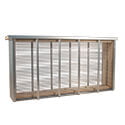


Two Deep Frame Isolation Cage
This queen isolator cage gives you control over your queen's location, allowing complex queen manipulations without the hassle of other caging or confinement methods. The cage is made of bars spaced like a queen excluder. This isolator holds two deep (9-1/8" tall) Langstroth frames and fits inside a deep hive body. The two frame cage is especially useful for varroa mite control methods where brood is limited to just two frames and is removed before mites can emerge.
If the queen is inside the cage, she will work to fill the two frames with brood but won't be able to leave.
If the queen is outside the cage, you can prevent her from laying eggs on the isolated frames.
In either case, workers will happily move through the bars to tend to the brood and the specific pheromones of a laying queen continue to keep the colony cohesive, which is not the case when caging her in a standard queen cage.
Uses include:
- Short-term confinement of a queen from a recently caught swarm or package, so that she can begin laying without any risk of the bees absconding
- Limiting the queen to one frame, and then removing that frame of brood, to produce a completely broodless colony for certain mite treatments
- Imposing a brood slow-down to limit colony growth before a dearth
- Isolation of the queen for a day to produce eggs or brood of a very precise age
- Short term isolation of the queen on one frame so that you can quickly find her later
Be careful to insert and remove the frame GENTLY and SLOWLY if the queen is on it, since she can be killed if she is scraped between the frame and the cage wall.
The cage occupies more space than two frames. In a 10 frame box, three frames should be removed to install the cage. In 8 frame boxes, it is possible to only remove two frames. Two deep frames are inserted into the cage, and the solid cover is placed on top. The cover sits on top of the frame's top bar, and can be removed to give access to the frame without the need to remove the cage itself. Since the top edges of the cage are flush with the sides of our wooden hive bodies, the queen will be perfectly contained. If you are using equipment of different dimensions, you may want to press some spare wax on either side of the top bar to absolutely ensure that the queen cannot leave the cage. Do not transport bees in the cage.
Product Specifications:
Outside Dimensions
- Top bar cover length: 19"
- Top bar cover width: 3-11/16"
- Top bar cover height: 1/2"
- Comb area length: 18-1/16"
- Comb area width: 3-1/2"
- Comb area height: 9"
Inside Dimensions
- Top bar cover length: 19" (end is open)
- Top bar cover width: 3-1/8"
- Top bar cover height: 7/16"
- Comb area length: 18"
- Comb area width: 3-1/8"
- Comb area height: 8-7/8"
Check out our newsletter article, Using a Frame Isolation Cage in Varroa Management to learn about the method of using isolation cages to control mites.

